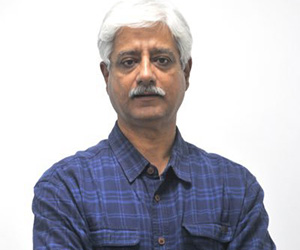Akali Dal giant who reshaped Punjab’s politics dies aged 95
Ramesh Vinayak
Sarpanch of Badal at 20, legislator at 30, chief minister at 43, and the last surviving member of a political generation that saw independence, survived the Emergency, and saw Punjab politics take a surprising turn in 2022, Parkash Singh Badal, 95, a five-time chief minister of Punjab, died on Tuesday.
In the tumultuous terrain of a front-line Sikh majority state, he was the quintessential moderate, a pragmatic practitioner of communal harmony, a liberal and secular man, and an avowed protagonist of and a fierce fighter for Punjab’s interests.
He was deeply religious, but not dogmatic. Hindu-Sikh amity, to him, was not a mere political slogan but an article of faith – an abiding quality that endeared him to Punjab’s Hindus.
In its 100-year-old history, Shiromani Akali Dal, one of the oldest regional parties, has not seen a figure as towering as Badal . He was the state’s longest serving chief minister, at 17 years across five terms. And he was president of Akali Dal from 1995 till 2017 when he handed over the mantle to his son and heir apparent Sukhbir Singh Badal.
Badal went to jail multiple times during and after the Emergency in the mid- 70s and the 80s as a leading light of the Akalis’ agitational politics, faced death threats from Sikh extremists, and was imprisoned in corruption cases in 2004 by his colleague-turned-rival Capt Amarinder Singh. But the Akali stalwart unfailingly bounced back. On the morning of the day he died, the Punjab police filed charges against him in the 2015 Kokatpura firing case when two protesters agitating against the mutilation of the Sikh holy book died in police firing.
The secret of Badal’s extraordinarily long political life lay in his tremendous grassroots connect. In one of his interactions with HT at his ancestral village Badal -- he was 85 at the time -- Badal shared the secret sauce of his outreach. His staff diligently kept a diary of deaths of even ordinary Akali workers across Punjab. And, Badal would later visit their households to express his condolences – a simple but emotion-imbued gesture that people never forgot and that over the decades cemented his credentials as a truly mass leader.
In his moments of reflection, Badal often casually called himself an accidental politician. He revelled in regaling his supporters by narrating the delicious story of his political debut. It went like this: After graduation from Forman Christian College, Pash, as Parkash Singh was addressed in his family, prodded by his father, a landlord, met his uncle Teja Singh who then was a minister in Punjab with a request for direct appointment as tehsildar (a mid-level revenue official). A few days later, Teja Singh called him to Chandigarh and handed him an appointment letter to the post . An elated Badal finished reading the letter and profusely thanked his uncle who then asked Badal to return the letter and tore it, much to Badal’s shock. “Pash, I want you to be someone who will appoint tehsildars,” he told Badal.
In 1947, Badal was barely twenty years old when elected sarpanch of his ancestral village in the politically crucial Malwa region. That was a stepping stone to the assembly which he entered for the first time as a Congress MLA in 1957. He later joined the Shiromani Akali Dal and emerged as a trenchant critic of the Congress, as he remained for the rest of his life.He suffered a setback when he shifted his base to the Gidderbaha assembly segment and lost to the Congress’s Harcharan Singh Brar in 1967, the first election after the reorganisation of Punjab a year before. Then on, his career saw a steady climb and never looked back. He went on to become the youngest chief minister of the state in 1970, at 43 (a record that still stands).
He would become chief minister again in 1977, 1997, and then, for two successive five-year terms, in 2007 and 2012. When he was sworn-in in 2007, he was almost 80, but such was hid hold on the state’s Panthic pitch, that there was no talk of his son replacing him -- not then, and not in 2017.
People attributed his longevity to his mastery of the art of consensual politics that helped him tide over challenges . “He was a people’s politician and dedicated himself to the cause of peasantry and rural society,” said political observer Pramod Kumar. “He was the main architect of peace building and communal harmony in the 90s”.
It was this approach that saw the SAD become an ally of the BJP in 1996, a partnership that would last a few years short of a quarter of a century. A pre-poll alliance with the BJP proved to be a formidable combination that changed the political and social dynamics of Punjab for next two decades. It stemmed as much from from Badal’s pragmatism as from his chemistry with BJP stalwarts Atal Bihari Vajpayee and Lal Krishna Advani. More than a political pact, it was a social coalition of power sharing between two principal communities of the state.
In 2021, the alliance broke after the SAD walked out citing the farm laws and the farmers’ protest -- and Badal returned the Padma Vibhushan, the country’s second highest award that he was given in 2015 . But the damage was done. His party lost the 2022 election, and he himself , then 94, lost his Lambi seat. Battered by two successive defeats in assembly polls in 2017 and 2022, Badal in his last years saw his once-powerful party struggling with an unprecedented crisis of political survival, ironically in its 100th year.By then, after being wracked by Covid, he was a shadow of his former self.

Ramesh.vinayak@ hindustantimes.com
( The writer is Executive Editor of Hindustan Times in Chandigarh)
April 26, 2023
.https://www.hindustantimes.com/cities/chandigarh-news/parkash-singh-badal-five-time-chief-minister-of-punjab-dies-at-95-remembered-for-his-grassroots-connect-consensual-politics-and-hindu-sikh-amity-101682455822029.html